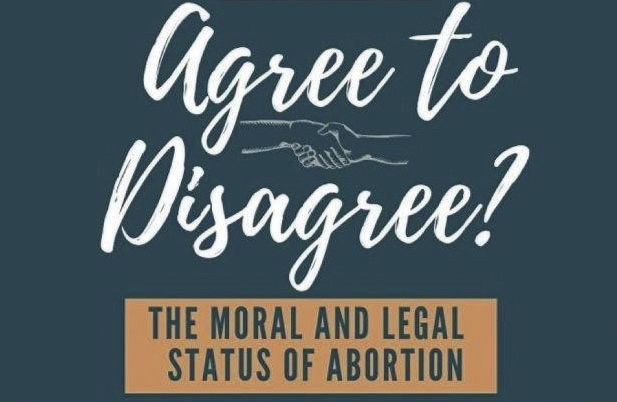University Presents Faculty Debate on Abortion
The Center for Freedom and Western Civilization, Dart Colegrove Commons and Hancock Common hosted a debate titled, “Agree to Disagree: The Moral and Legal Status of Abortion” on Tuesday, October 8 in Donovan’s Pub. The event aimed to tackle the topic of abortion while fostering “the abilities to listen carefully, consider different perspectives, and disagree respectfully [which] are essential to the pursuit of truth,” according to the Colgate website.
The event was led by a panel of Colgate professors, including Jenna Reinbold, Associate Professor of Religion, Professor of Philosophy David Dudrick, George Carleton Jr. Professor of Philosophy, and Susan Thomson, Associate Professor of Peace and Conflict Studies and Hancock Commons affiliate. Dudrick and Reinbold are both affiliates of Dart Colegrove Commons.
Professor of Psychology and Neuroscience Spencer Kelly introduced the event by addressing free speech and freedom of expression in relation to the issue of abortion. Kelly also moderated the faculty panel, which spoke on topics in relating to abortion, such as the separation of moral and legal assessments, medical procedures, transnational views, various philosophical premises and moral alignment. Faculty also answered a wide variety of questions regarding the definition of a human, whether or not a fetus can be considered to be a human being with typical rights, the act of prioritizing one life over another in both a statistical and theoretical sense, and what is it that makes human life important in the first place.
Psychology Intern Micah Dirkers played a large role in organizing the discussion.
“Our goal with this event was to ensure that literally anyone, left, right, middle, could have the opportunity to discuss this topic of abortion and see how professors with different views disagree, and disagree well. Disagreement quickly and often degenerates into disrespect, and those types of conversations don’t align with the values of a university seeking truth, respectful debate and discussion, but also critical interrogation,” Dirkers said.
Professor Thomson, representing a pro-choice stance, approached the topic of abortion and the question of moral versus legal assessments through an international lens.
“Having been raised in the 1980s in rural Canada, we talked about abortion as if it were a medical procedure. Our courts have litigated the moral questions that befuddle Americans and that don’t necessarily befuddle the rest of the world. Is it a moral question or is it a legal question? It’s legal in so far as the law in practice affects the lives of women and men, women in particular,” Thomson said.
Thomson also offered her perspective as a human rights lawyer who has litigated cases on genocide as a war crime and rape.
“Abortion comes to me as a legal question through particular harm sanctioned by the state. So, when the state sanctions harm and kills certain types of bodies because of their ethnic identity or religious identity, you then have [unwanted] children who result as a tactic of war. In many of the places where I’ve worked, it’s not a national conversation. It’s a private conversation; the state is hovering with its legal codes and its mandates and so on, but elder women decide for younger women,” Thomson said.
Professor Dudrick used philosophical methods and teachings in order to convey his pro-life stance.
“The first premise is that intentionally killing innocent human beings is morally wrong. The second premise is that abortion is the intentional killing of an innocent human being and therefore, abortion is morally wrong. This argument is what philosophers call ‘valid’, which means that if the premises are true then the conclusion has to be true,” Dudrick said.
Professor Reinbold said her position on abortion is less straightforward, and that she feels somewhat confused by the notion that abortion cannot be understood or talked about through a solely legal or solely moral perspective.
“The reason I am conflicted about this issue is that I don’t actually feel like it’s possible to separate the moral assessment of this issue and the legal and political assessment of this issue. Whatever the moral position is that you take on abortion, it immediately gives rise to specific policy issues related to what the government gets to tell people that they can and cannot do,” Reinbold said.
Professor Kelly, as Chair of Colgate’s Task Force on Academic Freedom and Freedom of Expression, spoke about the event’s overall success.
“The event nicely captured the spirit of Colgate’s recent Statement on Academic Freedom and Freedom of Expression. It bravely showed how it is possible to freely express controversial ideas, while also maintaining humility and modesty about your own view and curiosity and empathy for opposing views. We need more healthy models like this on campus,” Kelly said.
Professor Reinbold spoke on the importance of the event’s format, which allowed for constructive discussion.
“One of the things that became really clear to me in this event is the importance of assuming that the people you disagree with have good reasons for holding the beliefs they hold,” Reinbold said. “Even if you don’t ultimately agree with someone’s reasons for holding a particular position, it’s still crucial to understand what these reasons look like before jumping in with your own arguments and refutations.”
Senior Liz Fetzner attended the event, echoing sentiments expressed by Reinbold.
“I found the principle behind the Agree to Disagree event to be incredibly important, and the professors all did an admirable job. It is a valuable skill to be able to debate in such a way that promotes perspective development of the debaters as opposed to fostering animosity,” Fetzner said. “That being said, I think we are a very privileged community to have been able to have this type of conversation, fostered by academia giving us an ability to look at abortion as both a moral and legal issue.”











